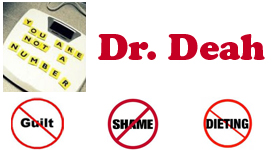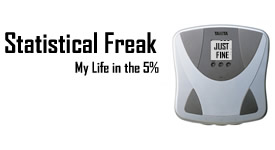Sneaky statistics
Some people are distrustful when statistics are thrown around, but I find that statistics can lead you in the right direction if you treat them like a puzzle, instead of an answer. When it came to the “obesity epidemic” there was this neat little narrative, where they’d line up statistics* in a row but rarely reference the numbers to each other.
So… if 60% of the population is overweight how is it that only 8% of the population has diabetes? Or how come 85% of diabetics are obese (out of 8% of the population) but obesity can be found in 30% of the population? If you look at the the numbers in a row, they just don’t add up.
There was a missing piece in this puzzle. I kept thinking, “How many obese have diabetes?”
I spent a year looking for that number. Turns out, only 18% of obese have diabetes. While it’s true, compared to the 6% of normal weight and 11% of overweight, that obesity is correlated with a greater absolute risk of diabetes than other categories of BMI, this clearly shows that most fat people don’t have diabetes.
The things to remember here is that correlation does not a cause make. I’m just looking at the question, “Do more fat people than thin people have diabetes?”
Trying to sort out if losing weight or never getting fat will stop the onset of diabetes is a separate discussion. Whether or not fat causes diabetes or diabetes causes fat is another discussion. The fact that slightly more fat people than thin people have diabetes is just a correlation that can point the science community towards research that needs to be done.
I’m not anti-science or anti-health… I’m anti-spin. I’m against public health policy makers using heavy-handed tactics to push forward an agenda. It’s not the statistics I mind, it’s the sneaky part that bothers me.
*2002 Trends in the Prevalence and Ratio of Diagnosed to Undiagnosed Diabetes According to Obesity Levels in the U.S.























I totally like the way you think, Elizabeth! This is a very good (easy to understand) statistic-based reply to those who constantly throw those skewed stats at fat people. It’s time to show them the other side of the coin…
Awesome. Thank you for digging up those numbers. These are handy stats to have and it’s always good to put statistics into perspective. I forget what it was, but I remember reading how people were spinning some statistic to say that 10 times as many obese people get Disease X, but when you looked at the actual statistics it said that 0.1% of the people in the Normal BMI get Disease X while 1% of obese people get it. So, the statistic is technically true, but the fear behind it isn’t.
Peace,
Shannon
I believe society (western society in particular) is looking at things the wrong direction. Being obese does not necessarily make you ill. However, from personal experience I can tell you, being ill can make you obese. It happened to me, and I have a feeling it’s not a rarity. Being overweight can be a symptom of an illness, a side effects of a medication, and in a lot of cases the medications used to treat the illnesses that cause weight gain, also cause weight gain. When faced with gaining weight slowly and feeling horrible, or taking a medication that might make me heavier, but help me feel better and be healthier in other ways, I took the medication. We have the right to make decisions about our own bodies. We can always make choices. What we can not always have, is control over what our body will do. We shouldn’t have to be made to suffer with our weight, about our weight or because of our weight.
Cell,
First off, welcome to Fierce Fatties.
I do believe that unexpected, significant weight gain is a symptom of something, as you said, which is why I’m not necessarily on board with the whole “don’t let doctors weigh you” thing. I think that, if anything, people should turn around on the scale and ask not to know the number. But if a person puts on a large amount of weight between appointments, the doctor needs to know why. There are diseases that can impact your metabolism and, like you said, many medications (particularly anti-depressants and anti-psychotics) tend to cause weight gain.
I think we, as Fat Acceptance activists, need to move away from the idea that all doctors are shills for the weight loss industry. Some definitely are… others are merely informed by the social environment saying that we must tell fatties to reduce. A good doctor will listen to your concerns about hyperfocusing on weight and a great doctor won’t even need to be told. But all doctors have an obligation to monitor our health indicators, of which weight can be one.
Peace,
Shannon